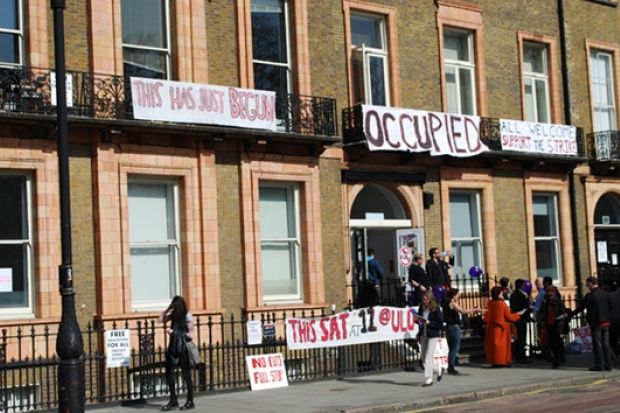The University and College Union held the academy’s first nationwide strike since 2006 today. There was evidence of the strike in the streets of Bloomsbury in central London, where staff and students mounted picket lines at entrances to the area’s cluster of higher education institutions.
At the School of Oriental and African Studies, a student occupation of the Faber Building has begun under banners stating: “Occupied. All welcome. Support the strike”.
At University College London, students have occupied the university registry and other offices.
UCL’s council is scheduled to decide today on its future fee level – almost certain to be set at the £9,000 maximum.
But the student occupiers have turned the council room into an impromptu headquarters, using a flipchart to draw up an agenda of duties including “design banners”.
Michael Chessum, education and campaigns officer at UCL Students’ Union, said the college had threatened to identify occupiers using CCTV and “pursue” individual students. He added that the institution was seeking to “persecute people for taking part in legitimate political protest in solidarity with UCU and against fee rises”.
A UCL spokesman said it was seeking a “court injunction to get the premises restored and the occupiers removed”, adding that it “would be legitimate to seek to retrieve those costs from those responsible”.
He added that the university would “be in court Friday with a view to obtaining an injunction to secure access to the occupied area, and removal of the occupiers”.
The students say they offered to leave on condition that the threat of punishment was withdrawn, but claim the college refused the offer.
On costs, the spokesman said the college would have to assess any damage before deciding whether students would be “pursued”.
“We cannot give an undertaking that the occupation will be consequence-free," he said.
Today’s action sees UCU members strike over employer-led cuts to Universities Superannuation Scheme pensions (for pre-1992 universities); government-led plans to increase member contributions and reduce benefits in the Teachers’ Pension Scheme (which covers academics in post-1992 institutions); and the employers’ 0.4 per cent pay offer and their refusal to agree a national deal on avoiding redundancies.
Johnny Darlington, membership secretary for Soas UCU, said the branch was “very thankful and proud of our students in supporting the strike”.
He added that the branch had mounted “very big pickets. We’ve had more than 130 people picketing over the past two days. It is the biggest number we’ve ever had.”
Clare Solomon, president of the University of London Union, said it had passed a motion committing to support the UCU strikes.
Sean Wallis, branch secretary of UCL UCU, said the campus was “quiet”.
He estimated that the number of striking staff at the institution was “probably doubled from 2006”, including many who “have never picketed before”.
Mr Wallis said the employers were issuing “the same press releases from 2006”, but had “lost the argument about being a safe pair of hands for the sector after running to the government to set whatever fees they see fit”.
Frank Harris, an undergraduate at UCL’s Slade School of Fine Art, said while handing out leaflets on the picket line that he had “only seen one student from the Slade go in – that is one out of about 400, which is pretty good”.
The Universities and Colleges Employers Association said the below-inflation 0.4 per cent offer, accepted by the three support-staff unions, was “the best offer that could be achieved in exceptionally difficult financial circumstances”.
It added that job security was a “matter for autonomous institutions”.
On the TPS, Ucea said the UCU was the “only trade union not awaiting the outcome of the current discussions between the Trades Union Congress and the government relating to public sector pension schemes”.
It said the USS changes were “moderate by any standards and include the retention of a final-salary pension for all existing members”.
UCL to charge top-whack fees
University College London confirmed on Thursday evening that it will charge the maximum £9,000 for 2012 entry for all its undergraduate programmes.
The college’s council decided to endorse the finance committee’s recommendation on fees in the face of protests from student campaigners.
UCL released no details of its bursary packages, but said it would submit “an ambitious an innovative access agreement next month to the Office for Fair Access, to ensure UCL’s traditions of openness and equity are maintained”.
